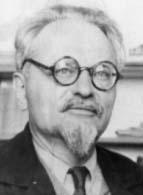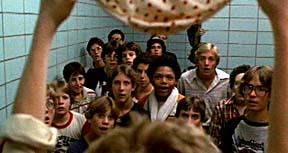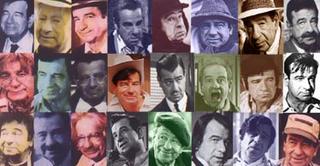Make Your Life Count!Life is DifficultThe first three words in Scott Peck’s famous book
The Road Less Traveled are “Life is difficult”. And I think there is a lot of truth in this. Life is difficult. It is messy. We do not live in a utopian world governed by utopian rules. We live in a flawed world that is governed by flawed human beings. Sometimes it can be easy to get discouraged when we confront this reality. But we should never allow discouragement about the realities of this earth to govern who we are, what we should do, and how we should live our lives.
C.S. Lewis warned us against writing off the collective wisdom of our previous ancestors. C.W. Lewis labeled this tendency the “snobbery of chronology”. The “snobbery of chronology” encourages us to presume that just because we happen to have lived after our ancestors and can read books about what happened to them, we must also know better than them. This is not the case. In fact, just the opposite is true.
The “Fortunes” of MenOne of the earliest poems in Old English was written in the year 1000 in the Anglo-Saxon language that we now refer to as Englisc. This poem was entitled
“The Fortunes of Men” and it showed that the people who lived in the year 1000 at the turn of the last millennium were, in many ways, no different than you or I living in the early years of the second millennium.
“The Fortunes of Men” conveys the sense of inner questioning and the stoic spirit of destiny that inspired people in the year 1000 to deal with the realities of life.
“The Fortunes of Men” examined the different destinies that a child born in the Year 1000 at the dawn of the first millennium might encounter in the course of their life. It prophesized that ‘hunger will devour one, storm dismast another, one will be spear-slain, one hacked down in battle.” But this poem also celebrated the joys that life can offer…good fortune at dice, a devious mind for chess, and strength in sports.
Which way will your life turn – to happiness or to some living tragedy? Will you have a devious mind for chess? Or will you be slain by a spear? To some extent, you do not have control over everything in life. Accidents happen. You may live to be 100, or you may die tonight in a car accident. Knowing this, we must each strive to make each day on this Earth precious. You must seize the day and make each day count so your life will count.
I do not expect everyone I befriend to be the next Einstein. I do not expect you to win the Pulitzer Prize or become the next Bill Gates or the next Oprah Winfrey. There are some things, however, that I do expect of each person (especially Rockhurst students and graduates!):
- I expect each person to apply their God-given talents to make their immediate world a better place.
- I expect each person to obey the laws of society and to insure that others around them do so as well.
- I expect each person to be hard-working in their chosen line of work.
- I expect everyone in this room to respect the basic dignity of human beings and not turn their back on a neighbor, friend, or family member in need.
- I expect everyone in this room to vote. Winston Churchill once said that democracy is the worst form of government ever invented – except for all of the other forms of government ever invented. We live in a free society and our obligation as free citizens is to vote in each election and make our voice heard.
The Hidden Talents WithinIn 1909, Mark Twain wrote a book entitled
Report From Paradise (also known as “Captain Stormfield’s Visit to Heaven”). The book is now out of print and not well known, which is a shame because this book is one of the most fascinating books ever written.
Report From Paradise examines the paradox of how each of us has hidden extraordinary talents locked within us, but may not have had the time or opportunity or the desire to unlock these special talents that we do have inside of us.
Take a look around you. You could be sitting next to a latent scientific genius who never pursued scientific training, or a latent brilliant military strategist who never joined the army. You could be sitting next to the greatest writer known to the English language or the greatest philosopher since Aristotle or Plato. You yourself may have a genius for music or architecture or political strategy. But that person sitting next to you could be so busy working a 9 to 5 job in order to live and eat indoors that they never had the chance to explore those natural talents. Albert Einstein worked as a clerk in a patent office in Switzerland for 7 years before he became the famous scientist that we know and read about today. Albert Einstein didn’t suddenly wake up after working as a patent clerk and become a brilliant scientist; instead, he was a brilliant scientist who had to work in the patent office in order to make ends meet. And that is so true with so many people that we encounter today.
In his book
Report From Paradise, Mark Twain wrote the following passage about this concept from the vantage point of Captain Stormfield as he walked around heaven:
“Shakespeare and the rest have to walk behind a common tailor from Tennessee, by the name of Billings; and behind a horse-doctor named Sakka, from Afghanistan. That is the heavenly justice of it – they weren’t rewarded according to their deserts, on earth, but here they get their rightful rank. That tailor Billings from Tennessee wrote poetry that Homer and Shakespeare couldn’t begin to come up to; but nobody would print it, nobody read it but his neighbors, an ignorant lot, and they laughed at it.”
Think about that concept before you laugh at some wild and crazy idea that a friend or family member has. Perhaps no one in our class is a latent Shakespeare or a latent Einstein. It is quite feasible to suggest that no one in our class will ever win the Pulitzer Prize or come up with a cure for all of the major diseases and afflictions. However, in the areas of personal finance, working hard, and making a difference in the society in which you live, there is absolutely no reason why everyone in our class cannot become wealthy over the course of a lifetime of hard work, be the best in their chosen profession, and make a positive influence on those people who are in your life. Let’s examine each of these concepts individually.
Working Hard, Saving, and Becoming WealthyIn the area of personal finance, there is no reason why everyone in our class can become a millionaire during the course of their lifetime. I am not talking about the easy wealth of playing card games at the casinos or playing the lottery. I am talking about the hard wealth of doing the right thing with the money that you do have. In the book
The Millionaire Next Door, the authors studied thousands of people who were millionaires in order to discover the principles that anyone can follow to become wealthy. What they found during the course of their research is interesting.
Being wealthy is not about how much you earn or how many possessions you have. It is about how much money you save, how much you invest, and how wisely you spend the money that you do earn. Money is a lot like closet space – the more you have, the more you want. You must resist the urge to spend every dime you earn on stuff you don’t need. This is really the secret to becoming wealthy. Becoming a millionaire is relatively easy to do. You must:
- Live within your means
- Save early and save what you can
- Invest prudently
- Avoid flashy cars, flashy clothes, and flashy lifestyles.
80% of millionaires in the United States made their own money by working hard, saving, and avoiding expensive luxury items. Most millionaires have never paid more than $400 for a suit or a watch. Most millionaires have never spent more than $20,000 for a car. Most millionaires marry once and live in the same house for many years. They avoid wasting money on luxuries they don’t need. They do invest in education, both for themselves and their children.
These are simple financial concepts that are available to each person in our class. I advise each of you to investigate these principles for yourself, apply them to your life, and slowly and patiently become wealthy.
In addition, you will need to work hard in order to succeed. In his autobiography
Grinding it Out, McDonalds founder Ray Kroc talks about the long days he worked to make McDonalds a reality – and he began his quest to build the McDonalds empire at age 53!
Some of you will learn and follow these principles and enter the world of the wealthy. Others may choose not to follow these principles and enter the world of poverty. The choice is up to you. You have the choice and the power to determine which type of “world” you will enter.
Making the World Around You a Better PlaceIt is important to realize that the pursuit of money does not in itself define success or the “the good life”. In 1968, Senator Robert Kennedy (the brother of President John F. Kennedy) ran for the Democratic presidential nomination. On March 18, 1968, Senator Kennedy gave a speech at the University of Kansas where he made the following statement:
"Too much and too long, we seem to have surrendered community excellence and community values in the mere accumulation of material things. Our gross national product ... if we should judge America by that - counts air pollution and cigarette advertising, and ambulances to clear our highways of carnage. It counts special locks for our doors and the jails for those who break them. It counts the destruction of our redwoods and the loss of our natural wonder in chaotic sprawl. It counts napalm and the cost of a nuclear warhead, and armored cars for police who fight riots in our streets. It counts Whitman's rifle and Speck's knife, and the television programs which glorify violence in order to sell toys to our children. Yet the gross national product does not allow for the health of our children, the quality of their education, or the joy of their play. It does not include the beauty of our poetry or the strength of our marriages; the intelligence of our public debate or the integrity of our public officials. It measures neither our wit nor our courage; neither our wisdom nor our learning; neither our compassion nor our devotion to our country; it measures everything, in short, except that which makes life worthwhile. And it tells us everything about America except why we are proud that we are Americans."
There is so much truth in what Senator Kennedy said in this 1968 speech. You need to stop measuring your success in terms of the size of your wallet and the square footage of your house; instead, measure your success in the number of quality relationships you have with others and the number of hobbies you pursue. Don’t worry about getting a BMW or that giant house in the hills. When you die, these things won't matter.
With Kennedy’s words still fresh in our ears, let’s enter an imaginary time machine and go forward 50 years into the future. When you look back on the world of 2005 from the vantage point of 2055, you may see a quaint and primitive world in terms of technology. Or you may long for the world you see around you on this wonderful October evening. The choice is up to you to make the future – your future – count in order to better the world around you. When I was in high school, I had a blunt, plain-spoken teacher who told his students that we could either join the group of people that make messes in the world or the group of people that clean up the messes in the world. Which group will you join?
- Will you save the world from environmental decay? Or will global warming wash you away?
- Will you thrive in a professional world that rewards free enterprise and courage, or will you be ground down in a working world that consumes your time and steals your soul?
- Will you live in a social world that is color-blind, or will you be mired in a world of racism and hatred based on the color of one’s skin?
- Will you live in a political world that prizes civility, achievement, and compromise, or in a world where ideological purity and partisan advantage prevails and makes public service intolerable?
- Will you live in a moral world that recognizes and honors clear standards of right and wrong, or live in a world mired in the swamp of situational ethics and an “anything goes” morality?
- Will you live in a financial world where you are responsible with your wealth and spending decisions, or live in the financial hell of credit card debt?
- Will you live in a world where you can retire peacefully, knowing that you are financially secure? Or will you live in a financial world where you live paycheck to paycheck, have no viable financial future, and be dependent on government entitlement programs that have no viable long-term future?
The choice is up to you in terms of what type of life you want to live and what type of world you want to live in. The poet Henry David Thoreau wrote that most people live a life of quiet desperation. God, I hope that no one in this class lives a life of quiet desperation. What a rotten way to lead your life. But I see quiet desperation all around me, each and every day:
- Parents who do not reach out and build meaningful relationships with their children.
- People trapped in jobs they hate in order to pay for things they do not need.
- People fretting how they are going to pay their bills.
- Kids playing video games and watching TV and letting their brains rot away.
- Adults playing video games and watching TV and letting their brains rot away.
- People driving their metal coffins to work each day, unhappy and broken.
Resist these urges! We live in an awesome, free country that is wealthy and offers a whole host of options for each individual willing to make the effort to reach out. Visit the library. Visit a park. Visit a museum. Go to an opera or play or ballet. Read a good book. Exercise. Take a walk with a friend or with a family member. Make a long distance phone call to that friend or family member who lives far away. Make sure that you are among those who clean up the messes, not making them. De-complicate your life. All of these things can be easily done today. Like the ads for Nike say, “Just Do it”!
Will you seize the day – carpe diem – or will you succumb to living a life of quiet desperation? You can make your life count, and yes you can live forever. Not forever in a physical sense because we are all destined to grow old and die. But you can live forever in terms of being remembered for the good works that you do and the quality of your character. Two quotes from Robert Kennedy help put this point in perspective
1) “This world demands the qualities of youth: not a time of life but a state of mind, a temper of the will, a quality of imagination, a predominance of courage over timidity, of the appetite for adventure over the love of ease.” (Day of Affirmation Address, University of Capetown, South Africa, 6 June 1966).
2) “The future is not a gift: it is an achievement. Every generation helps make its own future. This is the essential challenge of the present.”
Make your life count. The stream of time often doubles on its course but it always makes for itself a new channel.
Other words of wisdom to take with you in the months and years ahead:
1)Make education a life-long passion. As Glen Winterbourne stated, “If you’ve got nothing interesting to say, learn something that is.”
2) Never give up. Winston Churchill, who saved England from Nazi invasion and takeover during World War II, said “I like a man who grins when he fights.”
3) Always strive to be the best. Steve Prefontaine in
Without Limits states “I don't want to win unless I know I've done my best, and the only way I know how to do that is to run out front, flat out until I have nothing left.”
4) Be humble and follow the Golden Rule. As James D. Miles states, you can easily judge the character of a person by how they treat those who can do nothing for them.
5) Do not be afraid to dream and think big thoughts. Edgar Cayce wrote that nothing happens that is not first dreamed.






















